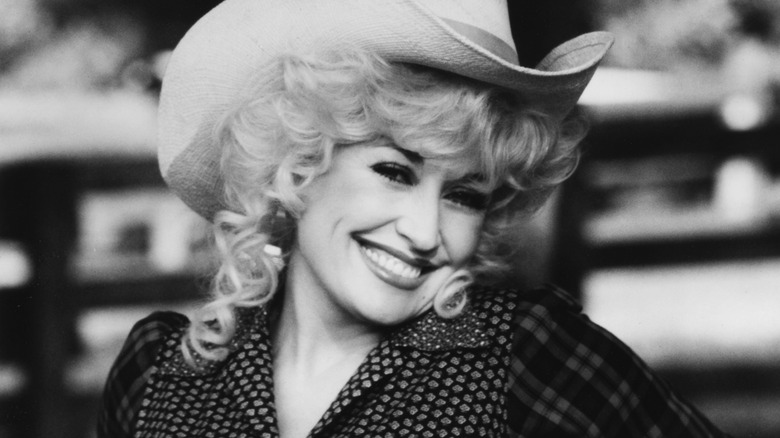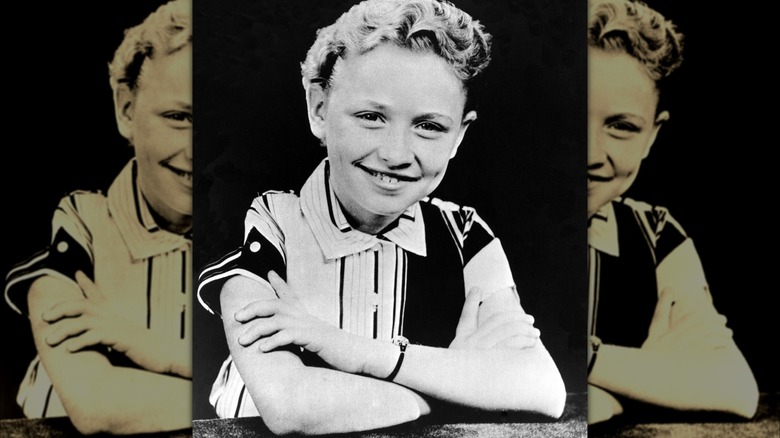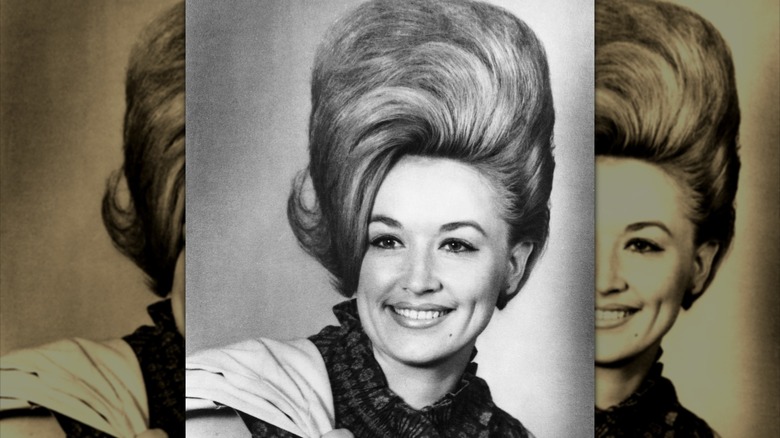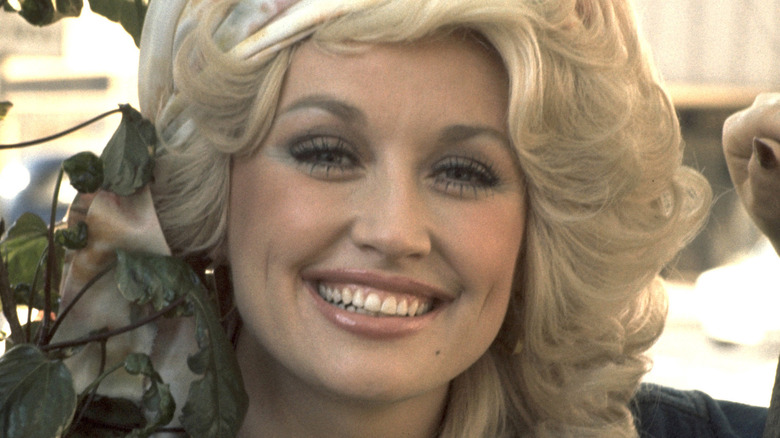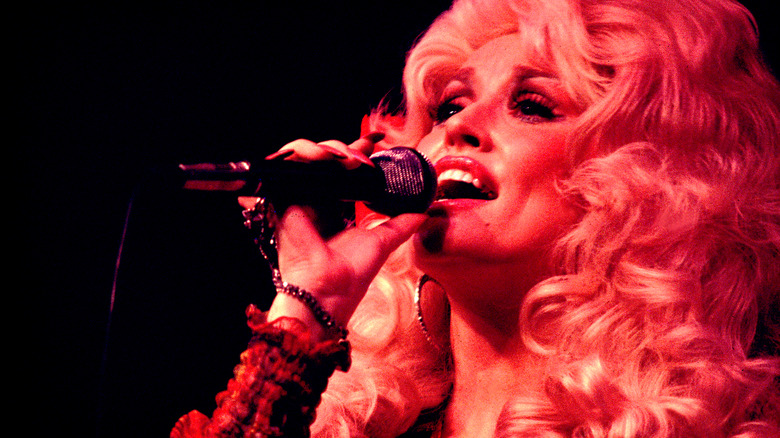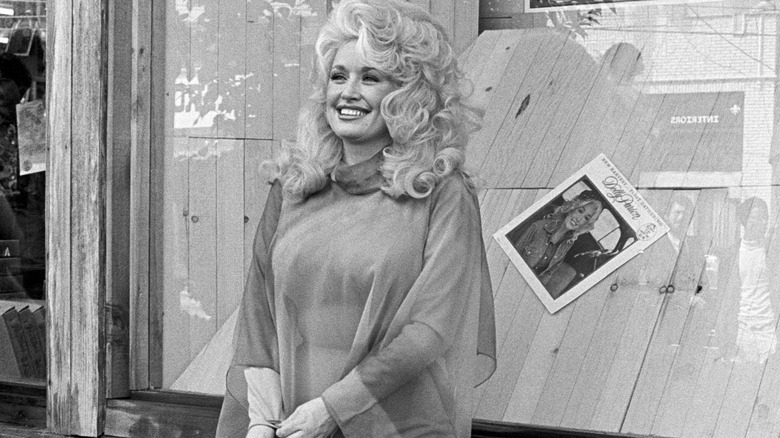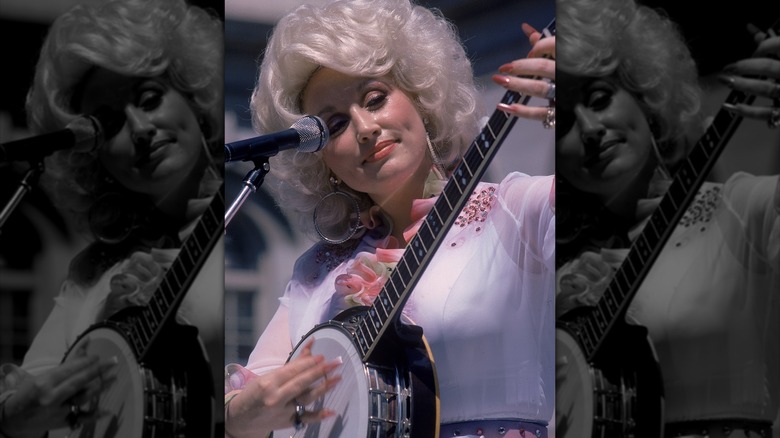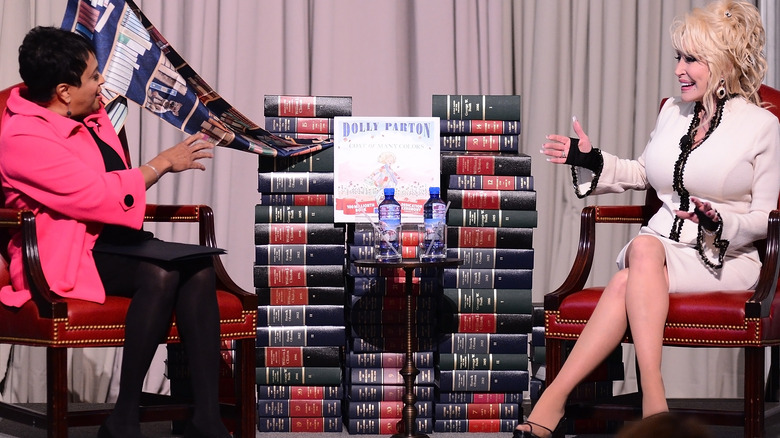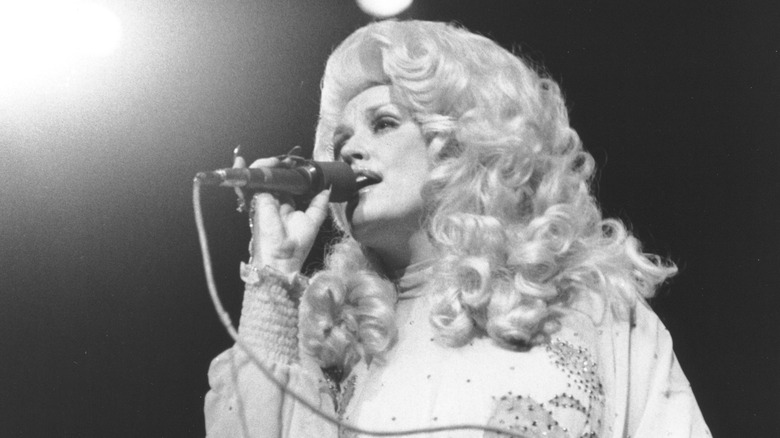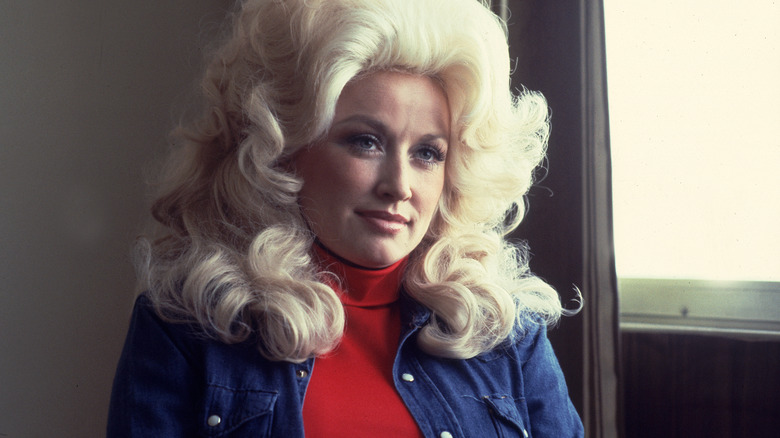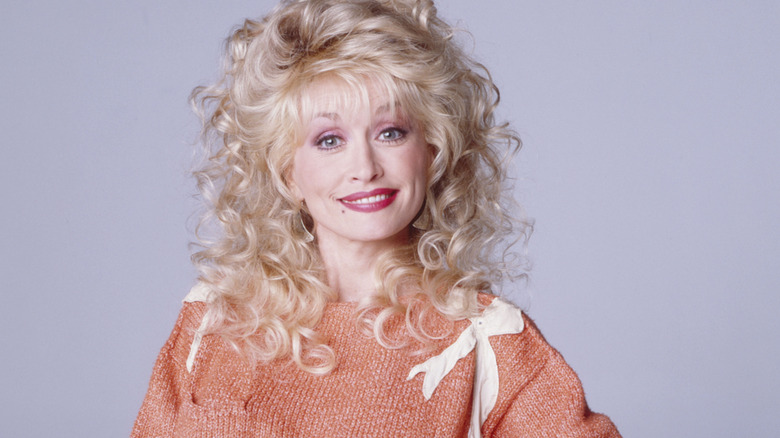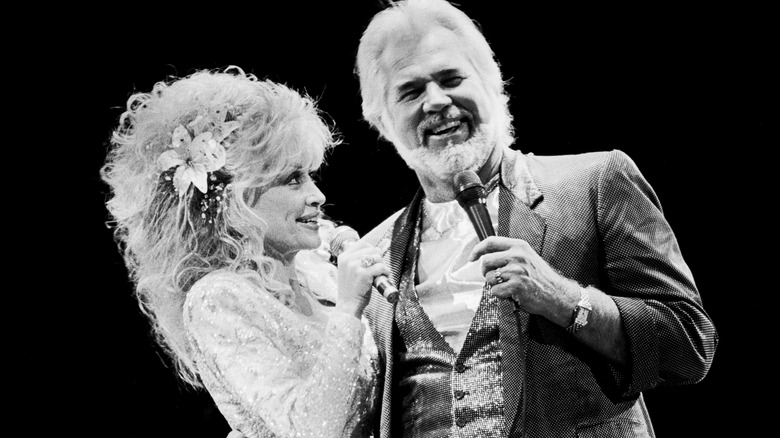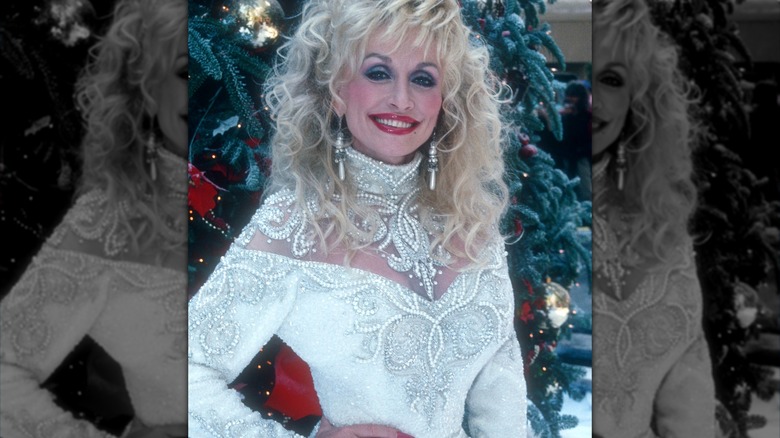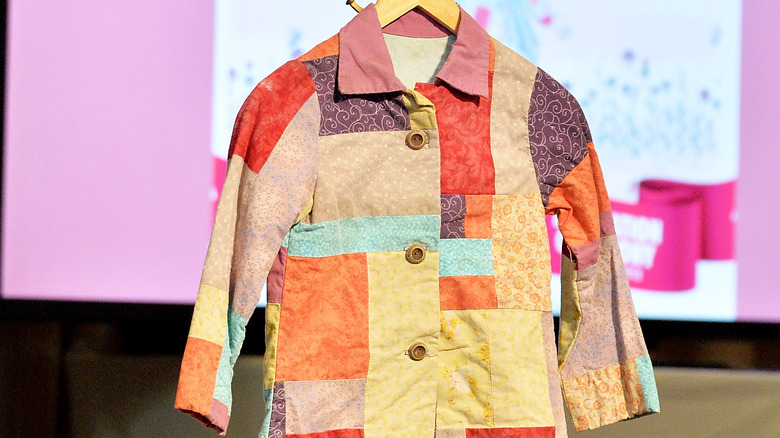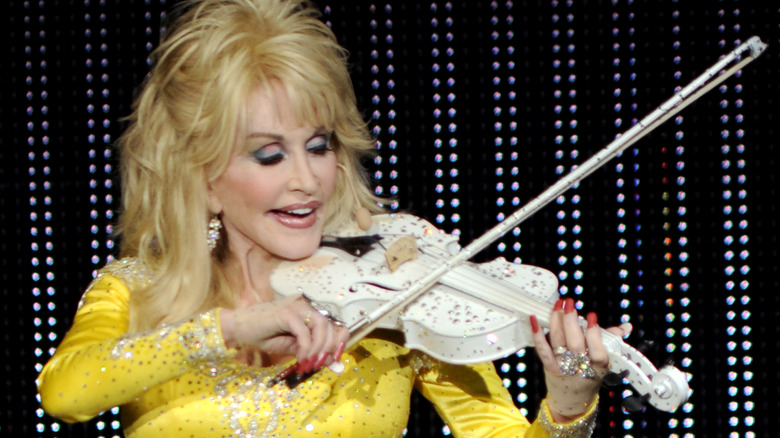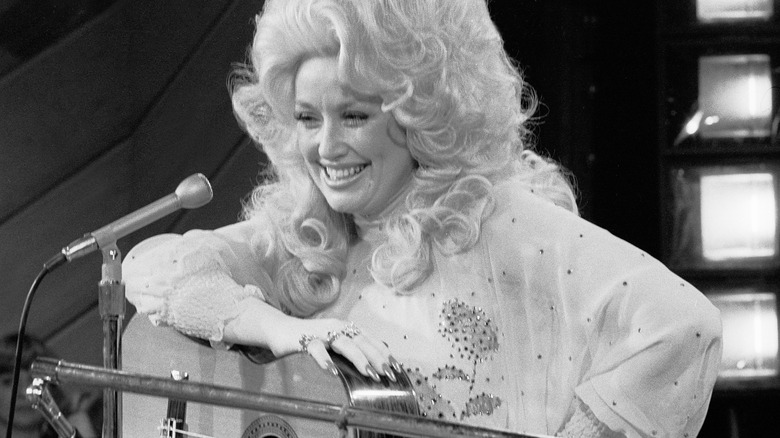What Dolly Parton's Mountain Upbringing Was Really Like
Dolly Parton is a reminder that there are good people in this world, who spend their hard-earned fortunes on projects that make the world a better place. How much better? For starters, as of this writing, her Imagination Library has celebrated more than 220 million books gifted to children around the world.
Parton has always been candid about the fact that her huge family might have been monetarily poor, but they were rich in love and values. When she was voted one of the 100 Women of the Century by USA Today, she said, "I just always felt like I knew who I was, and I just try to stay anchored within myself and my beliefs."
And yes, she confirmed that she had been a born performer. Her neighborhood didn't even have electricity until 1951, but from the time she was very, very young, she'd take a tin can, put it on a stick, and pretend it was a microphone. A born performer, sure, but an international superstar? When Good Housekeeping spoke with those who knew her when she was young, they chatted with her former teacher and guidance counselor, Julia Householder. "She was just a normal, giggly girl," she recalled. "... she talked to me about wanting to go into music and entertainment. I can't recall what I said to her, but I hope I told her to keep trying. However, nobody in their wildest dreams imagined Dolly would become such a big star." Especially considering her humble beginnings.
Loads of siblings and her own difficult entry into the world
Dolly Parton has been extremely open about the poverty that she was born into, and in her memoir, "Dolly: My Life and Other Unfinished Business," she confirmed that one of the oft-told tales about her — one that sounds completely fictional — is true. When she was born in the winter of 1946, she wrote that it was an extremely difficult birth for her mother even though she was the fourth child of what would eventually become 12 siblings. It was such a hard birth, in fact, that there were fears that either she or her mother might not survive.
These weren't the days of air-lifting someone to the hospital, either, and Parton wrote that the local doctor had risked his own life to ride alongside a treacherous mountain path during a storm. At the time, it was just something that he did: Parton would later become an honorary chairperson for the Dr. Robert F. Thomas Foundation, which is dedicated to improving health care for Sevier County, Tennessee. That's where she was born, and where he averaged about 1,000 such home visits each and every year during his long career.
Parton says that her father hadn't been able to pay the doctor cash for riding out to deliver her, and instead, gave him a sack of cornmeal. "I have often joked that I have been raking in the dough ever since," she wrote in her memoir. "Being born poor is something I am neither proud nor ashamed of."
Memories of her parents' love and discipline
Dolly Parton was the fourth child of Avie Lee and Robert Lee Parton. The musician has said that even though they grew up incredibly poor, they made it clear that they treasured and loved all of their children: Willadeene, David, Denver, Bobby, Stella, Cassie, Larry, Randy, Floyd and his twin, Freida, Rachel, and — of course — Dolly. In her memoir, "Dolly," she wrote, "I have found that poverty is something you don't really realize while you're in it. At least not if you're a kid with a head full of dreams and a house full of loving family."
Parton described her father to The Guardian, writing of a man who had worked as a sharecropper, and been dedicated to providing for his family. "My daddy was a smart man and a hard worker who carved out a life for us with his hands and his strong back," she wrote, saying that even though he wasn't the type to be vocal or expressive about his feelings, "I could always see the tenderness in his eyes."
Memories of her mother, too, are of a loving woman who cried when a very young Parton made it home — clinging to the neck of the family cow — after being lost. But, she added, she also got one of many "plain old Tennessee butt whippin's." She clarified that she didn't see it as abuse: Her mother would hit them with a switch and her father with a leather strap, whenever, she said, they deserved it.
If you or someone you know may be the victim of child abuse, please contact the Childhelp National Child Abuse Hotline at 1-800-4-A-Child (1-800-422-4453) or contact their live chat services.
Growing up with her beloved Aunt Marth
It's not just parents that have a lasting impact on the adults that children become, and in her memoir, "Dolly," Dolly Parton wrote that some of her earliest memories involved the woman she called Aunt Marth. Martha Williams wasn't her aunt by blood, instead, she owned the land where Parton's father worked as a sharecropper. She wrote, "I couldn't have loved her more. ... I was often left with her when I was little. She was a good friend to me, and she made me feel special."
Parton recalled her home as being equal parts welcoming and amazing: There were always hoecakes and gingerbread treats, songs to be sung, and hypnotic sights like the giant spinning wheel that Parton remembered being "as big to me then as a Ferris wheel." They moved away when Parton was five, into a house she remembered as having a leaky roof, an overgrown yard, and walls lined with newspaper as protection against the elements.
Her beloved Aunt Marth passed away three years later, and when they returned to pay their respects, Parton wrote that she wished she hadn't seen the figure lying in the open coffin. She recalled being tormented by some of the boys who were also there, who told her stories of embalming and burial, and who made her touch "the cold, clammy skin of the person who had been so dear to me." It had a lasting impact: She doesn't attend funerals.
Her family was extremely religious
Dolly Parton has never shied away from topics like faith and religion, and it's been an important part of her life since childhood. Way back in 1977, Chet Flippo interviewed her for a massive Rolling Stone story (via "Dolly on Dolly: Interviews and Encounters"). One of the things they touched on was her religious upbringing, and she was straightforward about the fact that she believed in God, and also believed that she was a sinner, although she noted, "I think I'm a vanilla sinner — too bad to be good and too good to be bad." Parton was always up close and personal with religion, as her grandfather was the local church's preacher.
"I remember the hellfire and brimstone he used to preach, and how I used to be real scared of that," she shared. "And I think that inspired me or depressed me into writing all these sad, mournful songs. You kind of grew up in a horrid atmosphere about fear of religion. We thought God was a monster in the sky."
It wasn't all terrible though. In her memoir, "Dolly," she wrote about finding comfort in the imaginary friends that she called her angels. She said that she had always felt very, very different, and explained that her angels were always understanding, always with her, and supported her with an understanding that she struggled to find elsewhere. "They understood why I had to sing, why I had such dreams," she wrote.
Her neighbors have spoken about how everyone in the area lived rough
Dolly Parton is famously from rural Tennessee, but to be more specific, she's from a town called Sevierville. When Good Housekeeping reached out to those who knew her family, they found that her story wasn't unusual. If anything, they had a few things that made others a bit jealous: Even decades later, locals talked about envying the family's massive patch of potatoes, and the fact that her mother's skill as a cook meant they always had decent meals.
Although she grew up without a lot of the things that get taken for granted today — like electricity and indoor plumbing — it wasn't as if she could run to the neighbor's house and know what she was missing out on. The town didn't even get wired for electricity until 1951, and even in hindsight, Parton says they took it all in stride. She wrote (via "Dolly"), "I have often joked that we had 'two rooms and a path, and running water, if you were willing to run to get it.'" She also wrote that when they moved into a new house, she was always excited to see what newspapers the previous occupants had used to insulate the walls and fill in the cracks.
That said, it wasn't all bad. Faye Dunn grew up near the Parton family and recalled that for all their hardships, "I always loved to go to the Parton house, because they all had so much fun. Dolly was the happiest person I ever saw."
She credits her family's influence for her musical success
In 1989, Dolly Parton sat down to talk with Interview magazine around the release of "Steel Magnolias" (via "Dolly on Dolly: Interviews and Encounters"), and said that those who had the most influence on the development of her musical talents were her family: "I grew up singing in the church, hearing my uncles and aunts sitting around, picking guitars and banjos and mountain instruments and singing — that, more than the big stars, was my introduction to music.
In another interview (with The Great Speckled Bird), Parton spoke about listening to her cousin play the mandolin, and her grandfather playing the fiddle. They'd had a piano, too. It wasn't a great piano — there was no ivory left — "but we got a pretty good sound out of it." Music was a way of life, but it was the banjo that captivated her above all others.
And it was her mother, too, that Parton credits for her musical genes. She told The Guardian that her mother and her mother's entire family loved music, and added that her own siblings were less than thrilled when she would insist on taking center stage during whatever performances they were putting on. "They had no interest in taking a back seat to me," she shared, and went on to thank her uncle, Bill. "As I was growing up, he's the one who saw my potential and worked so hard to give me a chance in the business," she said.
Her Imagination Library is a tribute to her father
When it comes time to compile a list of the world's greatest philanthropists, Dolly Parton's name is going to be on the list. Her Imagination Library and child literacy programs are just a small part of what she's done to give back, but it's possible that these are the most meaningful. Why? She developed the programs to honor her father.
She explained to ABC News that she always knew that it bothered her father that he hadn't been able to read and write: "He seemed so crippled by that, but Daddy was so smart," she said. "I felt I wanted to do something to honor my dad," and if there's anyone out there who thinks that's not as wholesome as apple pie, it's safe to say they have no soul.
Parton has also said that when she was growing up, they weren't even allowed to have even their school books in the house ... for a strange reason. "We had so many little kids in the house. They would just chew them up, tear them up, pee on them, whatever." Reading only took place at school — except for reading from the Bible, which the kids knew better than to destroy — and Parton says that not only was her father incredibly proud of her work with the Imagination Library, but he had helped her get it off the ground. "He loved hearing the kids call me 'The Book Lady.'"
A devastating illness claimed the life of her brother, and nearly took her mother
Even though Dolly Parton talks about her childhood with fondness, that doesn't mean that it was free of tragedy. In her memoir, "Dolly," she talked about her mother's terrifying bout of spinal meningitis. That, notes the Mayo Clinic, is an infection and inflammation of the structures around the brain and spinal cord. Severe cases are fatal, and according to Parton, doctors had told their family that her mother wasn't expected to survive. When she did, doctors described her recovery as miraculous.
Tragedy followed on the heels of that miracle, though. Avie Lee Parton had been pregnant, and before she'd fallen ill, she'd told Dolly that the baby was going to be her special sibling. "As the firstborn crop of kids got old enough to have some responsibility, Mama would assign each of us a little one in the next wave to help care for." Dolly's special sibling was going to be the new baby, Larry, but Larry tragically passed away the day after he was born.
"For the first time in my life, I couldn't sing," she wrote. "I wouldn't leave Larry's grave. I would take a lantern up on the hill and sit there most of the night talking to him and crying." It took her a long, long time to come to terms with the loss, and said that she finally found peace in the realization that the only people who feared death were those that still lived.
Her first teacher has fond memories of her
There's an old joke about older generations insisting that in order to get to school, they had to walk for miles, through the snow, uphill... both ways. It turns out that's not entirely too far from the truth of Dolly Parton's Tennessee upbringing, and according to what her first teacher, Mrs. Archie Ray McMahan, told Good Housekeeping, getting to school wasn't easy. Parton, McMahan said, had about a two-mile walk to get to the rather remote schoolhouse, and when it was snowing or cold, she said students were nearly frozen by the time they got there.
And considering she probably first started making the trek when she was just two or three years old, it's not surprising that McMahan remembered sitting with the students and rubbing their feet and legs to restore circulation. But wait, why was she in school so young? It was normal at the time: Older brothers and sisters would bring their younger siblings along with them.
McMahan shared her most vivid memory of Parton, who was enrolled as a student when she was five. She was teaching the students to read, and realized that Parton wasn't reading the book, but reciting from memory. "So, I got some flashcards and worked with her, and then she learned to read. The thing I remember best about her is that she was always ready with an answer."
Caring for her grandmother taught her kindness and compassion
When sharing stories of her childhood in her memoir, Dolly Parton has admitted she had what she called "a streak of devilment in me." It was never malicious, though, and even though it was more often curiosity that got her into trouble, trouble was definitely a big part of her life. But so was the kindness and compassion that would later come to define her as an adult, and she shared stories of how she would spend some quality time with her paternal grandmother.
Parton said that after giving birth to her last child, Bessie Parton had developed a condition where movement — her own, or the movement of those around her — would make her sick. Bedridden by her condition, Parton recalled, "I just couldn't stand to see her just lying there. It seemed like somebody had to mess with her to remind her she was still alive. I took on that job."
That meant antics like sliding a frozen bedpan under the sheets, and trying on her false teeth, then dancing just out of arm's reach. But Parton says that they also shared an incredible bond: She would sit and brush her grandmother's hair and care for her nails, brush those false teeth (when she wasn't trying to wear them), and was the only grandchild who would sit with her. "She loved for me to do that. I'd massage her feet and do whatever I could to make her feel better."
She improvised makeup from what she had, and never felt beautiful
Most kids go through a phase of struggling with their self-image and that's true even for those who grow up to be rich and famous. In her memoir, "Dolly," Dolly Parton wrote about always comparing herself to her sisters, and feeling as though she could never quite measure up to them. She grew up envious, saying, "I was a pale, skinny thing with corn teeth and hair that was fine and close to my head. And then there were those hated freckles."
That led to a major conflict with her parents, particularly her father. Parton wrote that he didn't think that makeup was an acceptable thing for his daughters to wear, and banned her and her sisters from using it. That, she said, made them want to experiment with cosmetics even more, and not only did they definitely go all-in as soon as they left home, but Parton says that she improvised while still under her parents' roof.
For lipstick, Parton says she used to use a few things, like Merthiolate and Mercurochrome — and it's worth saying that no one should try this at home. The first (which turned her lips slightly orange) is a mercury-based antiseptic that was banned in the 1990s, while Mercurochrome was a bright red and yes, also contained mercury. Flour and the juice from pokeberries doubled as face powder and rouge, and she used burned matches to create eyeliner.
Christmas was always special in spite of some difficulties
Fast forward to 2022, when Dolly Parton sat down to talk to Better Homes & Gardens about what might be her favorite holiday: Christmas. She starts decorating while there are still Thanksgiving leftovers that need to be finished off, and there's one tradition that remains the same: The first ornament hung on her Christmas tree is a patchwork star that her mother had made, years ago.
Growing up, she said that the Christmas decorations were popcorn garland (that she still makes every year), colored pieces of paper and fabric, and eggs covered in foil. She also still has live trees, because heading out with the family to pick out their Christmas tree was a time-honored tradition. "And we'd all want to hold the ax, but he wouldn't let us, because we'd have probably chopped each other to pieces."
Parton wrote in her memoir, "Dolly," that while her grandmother would sometimes order toys for the kids out of the Sears catalog, it wasn't even about the toys even when she was little. Instead, it was gathering fresh snow to make snow cream — a version of ice cream — making gingerbread men to decorate the tree, singing Christmas carols, and telling stories. Christmas stockings were filled with candies and other goodies, each of the siblings would get at least one store-bought gift, and her father would always get a box of chocolate-covered cherries (that he would share) and some handkerchiefs.
Her Coat of Many Colors
Songwriting is a talent Dolly Parton has always had: Her very first was about a corncob doll that her mother had made. One of her biggest hits — "Coat of Many Colors" — is not only a favorite, but it captures one of the most vivid memories of her childhood. She explained (via Hamilton College music professor Lydia Hamessley): "Whenever I sing that, I just see my whole childhood."
Her coat of many colors was made out of necessity. Winter was coming, and her mother made her own out of rags, bits and pieces of fabric. "So, while she made that coat she told me the story about Joseph in the Bible," Parton told GPB. "And boy, I thought I just really looked like Joseph, and I was so proud of it, and wore it to school. And the kids laughed and said it was just rags, and I didn't look like Joseph, and that we were poor and all that. I remember crying so hard."
She wrote in her memoir, "Dolly," about just how much the coat had meant to her. It had, after all, been something her mother made just for her, something that was hers and hers alone, made with such love. Even after the kids at school laughed at her and made fun of her, she wrote, "They would not shake my pride in my coat, my love for my mother, my faith in myself. I would not have it."
She was bullied and ridiculed by classmates
Even though Dolly Parton has said that what her family lacked in finances they made up for in love, school was still difficult for her. She wrote in her memoir, "Dolly," that going to school made her realize how little they had. They would, she says, be asked to tell the class what they had for breakfast, and she quickly grew embarrassed about only having biscuits and gravy. Embarrassment gave way to violence at one point, as she recalled the children of another family targeting her and her brothers. "We would come home beaten up every day. We stayed sore and bruised all the time," she wrote.
When her father went over to try to settle the matter, she said that it turned into a massive fight involving the adults, too, leading to a civil court case that was eventually thrown out. (She adds that they all became friendly by the time she got around to writing her memoir.)
But school continued to be the sort of thing that's better off forgotten, and was punctuated with terrible memories. One friend who spoke to Good Housekeeping said many "weren't nice to her," adding, "When Dolly comes home, she's nice to everyone, but you can tell she remembers who treated her badly." And that extended to very public ridicule. When she — the first in her family to graduate — got up on the graduation stage and shared her dreams of making it big in Nashville, she was met with laughter.
Going to the big cities opened up a whole new world
Dolly Parton was 10 years old when she first headed to the big city of Knoxville, Tennessee. Once she was there, she was on her way — and it opened up a whole new world for her. She wrote in her memoir that she'd go there any time she had a few days off from school and that she very quickly learned about some of the pleasures that life had to offer outside of her rural home. Namely?
"Jiffy burgers were wonderfully greasy little sliders from a place near Aunt Estelle's house," she wrote. "I wanted them more than anything. To me, they represented everything that mountain life wasn't." And she earned extra money to buy them, playing her guitar for passing pedestrians.
Good Housekeeping spoke with performer and songwriter Pearl Butler, who opened her home to Parton the year after she first hit the city. It was Butler who recalled taking her to buy her first bra, who made her a chocolate cake that she was so excited about that she dove face-first into it, who took her to see movies in the theater, and who remembered a young girl who was in awe of conveniences she was just starting to learn about. Light switches, flushing toilets, electricity... it was a taste of a much bigger world that would — after considerable struggle, heartbreak, and challenges — be ripe for the taking.
